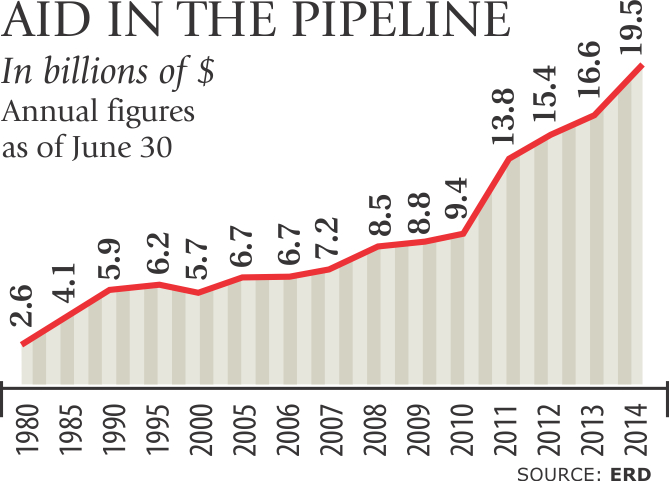The government has decided to intensify its foreign aid disbursement efforts this fiscal year in the face of a sudden surge in aid inflow: a record $19.5 billion.
It aims to dispatch 22 percent of the total by next June, after which the disbursement rate will be bumped up to 25 percent. In other words, some $4.29 billion in foreign aid has to be dispatched in fiscal 2014-15, up 43 percent from last year’s record disbursement of $3 billion.
The decision came at yesterday’s cabinet meeting chaired by Prime Minister Sheikh Hasina, during which the Economic Relations Division placed a report on foreign aid.
Foreign aid piled up in recent times due to an increase in commitments, Cabinet Secretary Musharraf Hossain Bhuiyan told reporters after the meeting.
But the government will take steps to improve the disbursement rate, including heightened monitoring at field level and frequent meetings with donors to expedite the disbursement process. It will also ask development partners to delegate more power to their field offices, he said.
Meanwhile, the ERD report said the aid pipeline bulged due to huge mobilisation of foreign aid starting from fiscal 2010-11. The average commitment between fiscal 2010-11 and 2013-14 stood at $5.6 billion in contrast to $2.6 billion between fiscal 2006-07 and 2009-10.
In response, the average disbursement between fiscal 2010-11 and 2013-14 was raised to $2.43 billion from $1.94 billion in the preceding four fiscal years.
“This means our ability to utilise aid has lagged behind our ability to negotiate new aid,” said Zahid Hussain, lead economist of the World Bank’s Dhaka office.
The report, however, said that the swell is likely to recede soon as the capacity for project implementation is continuously increasing.
One of the core reasons cited for slack aid disbursement is the delay in project take-off: it takes one to two years for projects to just start.
Some 62 percent of the delays were caused due to bottlenecks on the government’s side and 19 percent due to the development partners; 12 percent were due to both government and development partners, and 7 percent were affected by outside causes like political unrest, according to the ERD report.
The delays from the government side were by way of slow approval of project proposals and drawn-out tendering, contract awarding, project designing and land acquisition processes. The tardy tendering and contract awarding processes jointly contributed 26 percent of the delays.
From the donors’ side, lags in project approval and appointment of experts or consultants held back start dates.
“All these problems ultimately snowball into delayed disbursement of aid in the pipeline,” the report said, adding that it takes more than six years to complete disbursement on a project.
The report also presented a number of immediate and long-term action plans for increasing the
disbursement.
Source: The Daily Star










